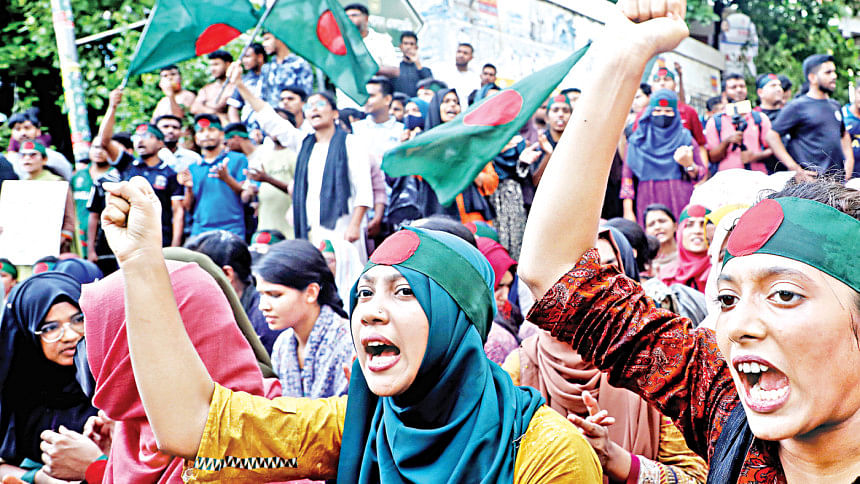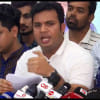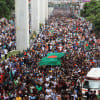July 6, 2024: 'Bangla Blockade' announced

The streets of Dhaka and cities across Bangladesh fill with chants, placards, and determination as the student movement enters its sixth consecutive day. Today marks a turning point -- protesters declare a countrywide "Bangla Blockade", vowing to bring life to a standstill until their demands are met.
At the heart of the capital, Shahbagh intersection -- the symbolic ground zero of student uprisings -- is once again blocked. By mid-afternoon, several thousand students pour into the streets, weaving through Dhaka University, BUET, and Eden College campuses before converging on Shahbagh. They raise slogans: "Dofa ek, dabi ek: quota not come back!", "Quota na medha -- medha, medha!"
Nahid Islam, a Dhaka University student and key organiser, announces that the "Bangla Blockade" will now take place daily from 3:00pm at key intersections in the capital as well as highways across the country.
"We will not return to classrooms until our demands are met," he declares to a cheering crowd, urging parents to join the movement and accusing the ruling party's student activists of attempting to disrupt the protests. As the hours stretch on, police presence looms nearby, while the demonstrators remain non-violent.
Elsewhere in Dhaka, Jagannath University students block the Tanti Bazar intersection, joined by students from Kabi Nazrul Government College and Shaheed Suhrawardy College. Their march parades through the streets before settling into an hours-long blockade that brings traffic to a halt.
The students' demands remain unchanged: abolish the reinstated quotas in government jobs; form a commission to revise the quota system, ensuring fairness and meritocracy; and introduce limits on the number of times an individual may use quota privileges. Their frustration runs deep, intensified by the Appellate Division's decision to uphold the High Court verdict reinstating the quotas.
Beyond Dhaka, protesters hold the streets with equal resolve.
In Chattogram, students of Chittagong University stage roadblocks for a second consecutive day, gathering at the bustling Muradpur-GEC intersection. In Rajshahi, university students bring the Dhaka-Rajshahi highway to a halt for an hour. In Rangpur, students of Begum Rokeya University paralyse the Dhaka-Rangpur highway, while in Tangail, students of Maulana Bhashani Science and Technology University block the main highway for 90 minutes. Even torrential rain cannot dampen the spirit of protest -- as seen in Kushtia, where students of Islamic University, drenched but determined, bring traffic to a standstill outside their campus.
In Khulna, students from various institutions, including Khulna University, gather at Shibbari intersection. In Mymensingh, students from Ananda Mohan College rally at the Town Hall intersection. Each blockade, whether lasting 30 minutes or several hours, sends the same message: the youth will not be silenced.
The movement, though leaderless in structure, grows more organised by the day. Messages circulate online, banners appear overnight, and campuses become hubs of mobilisation.
Political parties begin to weigh in. BNP Secretary General Mirza Fakhrul Islam Alamgir expresses moral support for the students, though the protesters themselves remain wary of partisan influence, insisting their movement is rooted in justice, not party politics.
As the sun sets on July 6, one reality becomes clear: the movement is gaining unstoppable momentum. The call for a "Bangla Blockade", announced for the following day, signals the protesters' determination to escalate their struggle into a nationwide civil resistance.

 For all latest news, follow The Daily Star's Google News channel.
For all latest news, follow The Daily Star's Google News channel. 







Comments